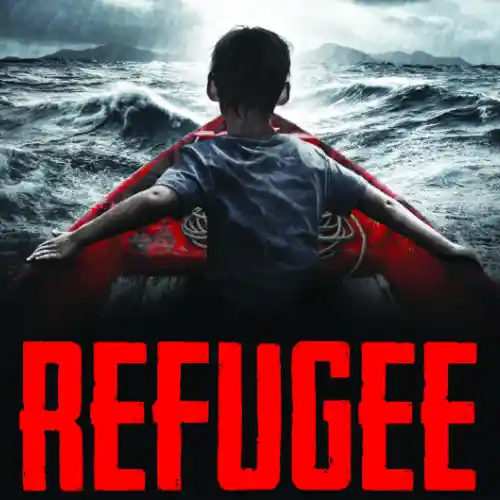The St. Louis was throwing a party. Even bigger than the one it had thrown the night before they’d reached Cuba. This one had the euphoria of more than nine hundred people who had been at death’s door and were suddenly, miraculously, saved.
Belgium, Holland, France, and England had agreed to divide the refugees among them. None of the passengers were going back to Germany.
Josef’s mother wasn’t alone on the dance floor anymore. She was joined by dozens of couples, all dancing with giddy abandon. Josef had even taken a turn around the floor with her. Passengers sang songs and played the piano with the orchestra, and one man who knew magic tricks entertained Ruthie and the other little kids in the corner of the social hall. In another corner, Josef laughed as passengers took turns telling jokes. Most of the jokes were about taking holiday cruises to Cuba, but the best was when one of the passengers got up and read from the brochure that advertised the MS.
St. Louis.
“ ‘The St. Louis is a ship on which everyone travels securely, and lives in comfort,’ ” he read. You could barely hear him over the hooting. “ ‘There
is everything one can wish for,’ ” the man read, gasping for breath, “ ‘that makes life on board a pleasure! We hope you’ll want to travel on the St.
Louis again and again!’ ” Josef laughed so hard he cried. If he never saw the MS St. Louis again in his life, he would die happy.
The next morning, the ship docked at a pier in Antwerp, Belgium.
Negotiations between Captain Schroeder and the four countries still took time, and it was a full day later when, under the grim portrait of Adolf Hitler, Josef and his family joined the other passengers in the social hall again to find out where they would be going.
Representatives from the four countries sat at a long table at the front of the hall, arguing over which passengers each would take. Every country wanted only the passengers with the best chances of getting accepted by America, so they could ship the refugees back out as quickly as possible.
Josef hoped they would get England, because it was the farthest away from Nazi Germany, safe across the English Channel. But when everything was settled, he and his family were assigned to France. They would be among the third group to disembark—after the Jewish refugees going to Belgium and the Netherlands were delivered, but before the last group
sailed for Great Britain.
The first group left that afternoon.
Josef watched with most of the other passengers as the refugees going to Belgium disembarked. Josef didn’t want to go to Belgium, but he was jealous nonetheless. Like everybody else, he was ready to get off this ship.
“Think of it—we traveled ten thousand miles on board the St. Louis,” one of the men leaving for Belgium told the other passengers as he stepped onto the gangplank, “only to end up three hundred miles from where we started!”
The line got a laugh, but a sad one. Josef was all too aware of the long shadow cast by Nazi Germany, and so was everyone else. Still, as long as the Nazis stayed in Germany, they would all be safe. Wouldn’t they?
The next day, 181 passengers disembarked in the city of Rotterdam, even though Holland wouldn’t let the St. Louis dock at their pier, just like in Havana. The refugees were taken into town by another ship and escorted by police boats.
As they sailed on to France, Josef wandered the decks. The ship had a strange, empty feeling to it. Half the passengers were gone. The morning they arrived in Boulogne, France, the 288 passengers who were traveling on to England gathered on C-deck to say farewell to Josef and the others who were disembarking.
“We’re due into England tomorrow,” Josef heard one of them say. “June twenty-first. That’s exactly forty days and forty nights in a boat. Now, where have I heard that story before?”
Josef smiled, remembering the story of Noah from the Torah. But he felt less like Noah and more like Moses, wandering in the desert for forty years before reaching the Promised Land. Was that France? The Promised Land, at last? Josef could only pray it was. He picked up his suitcase in one hand, took Ruthie’s hand with his other, and led her and their mother down the ramp into Boulogne.
“You see?” Mama said. “I told you somebody would think of something.
Now, stay close, and don’t lose your coats.”
At the bottom of the ramp, Josef watched as one of the other passengers got down on his hands and knees and kissed the ground. If he hadn’t had his hands full, Josef might have done the same thing.
The secretary general of the French Refugee Assistance Committee officially welcomed them to France, and the porters on the docks moved
quickly to carry the passengers’ luggage for them, refusing any and all tips offered.
Maybe this was the Promised Land after all.
Josef and his mother and sister spent the night in a hotel in Boulogne, and then they were taken by train to Le Mans, where they were put up in a cheap lodging house. Days passed, and life went on. Josef’s mother got work doing other people’s laundry. Ruthie went to kindergarten at last, and Josef went to school for the first time in months—but because he couldn’t speak French they put him in the first grade. Thirteen years old—a man!— and they put him in a classroom with seven-year-olds! It was humiliating.
Josef promised himself he would learn to speak French over the summer, or die trying.
He never got the chance. Two months later, Germany invaded Poland, touching off a new world war.
Eight months after that, Germany invaded France, and Josef and his mother and sister were on the run again.

